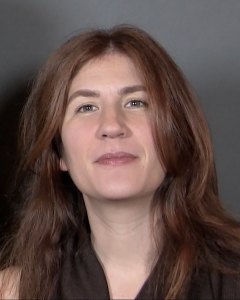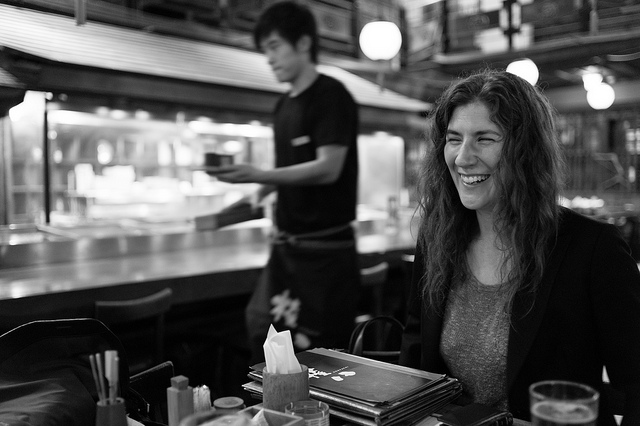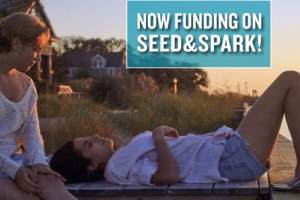Aileen Gemma Smith – Content Rescuer, Connector, Listener and Builder
New York City entrepreneurs come from all five boroughs, in spite of what Manhattanites below 14th Street may believe.
 Aileen Gemma Smith, whose hometown is Staten Island, is CEO of Vizalytics Technology Inc., a data analytics/information consulting company. At her core, she is an advocate for local brick-and-mortar businesses – and Vizalytics is enabling those local/small businesses to stay competitive by understanding what is happening around them. Subway delays/parades/new local ordinances are, after all, crucial, bottom-line issues for many New York City businesses.
Aileen Gemma Smith, whose hometown is Staten Island, is CEO of Vizalytics Technology Inc., a data analytics/information consulting company. At her core, she is an advocate for local brick-and-mortar businesses – and Vizalytics is enabling those local/small businesses to stay competitive by understanding what is happening around them. Subway delays/parades/new local ordinances are, after all, crucial, bottom-line issues for many New York City businesses.
So what is the constant observer of people and interactions up to? Aileen is driving her company’s mission to “enable change with data.” She is a person who loves asking “why is that?” so it is no surprise that she would have founded a business that is so consumed with minutiae and detail-driven.
She’s a CEO now, but has led teams at Newsweek, Financial Times Search and Razorfish, a digital agency. When not working with content or talking with customers, she’s an avid walker, but just don’t ask her toss out the first pitch at a Staten Island Yankees game [Sports are not her forte].
Who are your heroes?
Sister Raimonde, my forensics/debate team coach. Her style was blunt criticism, hard questions, and a high bar. “Is that your best?” She was tough because she wanted us never to stand down.
Other Heroes on my list: Gale Brewer [currently running for Manhattan Borough President), Lily Liu [an entrepreneur and Founder of Public Stuff, who previously worked in Mayor Bloomberg’s office], Adora Cheung [a data analyst and founder of homejoy.com], Diane Greene [on the Google board of directors], Jessica Livingston [founder of Y Comboinator], and Marissa Mayer [CEO of Yahoo].
What is your current challenge?
Scaling Vizalytics.
For our business, relationships are key. Local shopkeepers want the impact of someone spending time, noticing detail, empathizing with their frustration. This leads to referrals with other neighborhood businesses. Those word-of-mouth referrals are essential to building lasting trust. We’d like to reach more owners, more quickly. At the same time, we’re mindful that earned trust and respect with our initial users are great foundations for long-term growth.
Your greatest achievement?
That sounds like I’m done! My greatest achievement is never being satisfied and working to do more. On a practical note, I’m proud to be raising my sons to be independent thinkers who are compassionate, confident and creative young men.
What is your motto?
Onward! (Author’s note: this is my motto for 2014!)
Why are you an entrepreneur?
Dedicating my life to solving problems for others is what I love doing. Being an entrepreneur is the core of how I think and function in the world. It’s part relentlessness to build and create solutions, and the rest is a stubborn belief in an ability to execute, and a willingness to adapt and learn. Your life and your work are integrated the same way that muscle moves bone. They’re not independent.
What problem are you solving?
For local, brick-and-mortar shopkeepers the biggest pain point is, “I didn’t know and this cost us money.” Enter our Mind My Business app.
We use open data to solve two aspects of this pain point. First, we conduct a risk profile for fines and changes to regulations and permits. We tell owners what their specific store needs to do. Secondly, we tell owners what public works are happening near them (think construction, paving, blocked roads) that will impact business.
We put it all in a seamless mobile experience that is tailored to each individual business. We’re piloting in NYC, but the market for the top 25 urban areas with open data is over 500,000 businesses, and a quarter of a billion dollars. We have Chinese and Spanish language editions in the works.
What problem would you like solved?
Parity in schools, so students who have limited resources are able to succeed. I’ve met students whose hopes are stunted from a young age — it’s as though they’re encouraged to think small. I’d like to help change that isolation, and connect more students with opportunities. [See below for how Smith has made this a personal weekly activity.]
Biggest regret?
Not yet climbing a mountain.
Which talent would you like to have?
Fluency in seven languages.
What’s the best pat on the back you’ve ever received?
I did a professional development tour through four cities for health care professionals in Taiwan. I was at IBCLC at the time at the first private practice in Tokyo. I supported other organizations throughout Asia as part of my role. The women who organized the trip and sessions were amazing. But the most humbling experience was how they thanked me for believing in them. “We can do this together.” I visited four cities, made eight presentations and met with many people informally to share knowledge of best practices for breastfeeding.
Advice you wish you’d had (or had followed)?
Learn how to build financial models. If you don’t know how, figure it out.
And never be afraid of math. To riff on Jeanne Sullivan, “You can learn this.” I’d add that you not only can — you have to.
Your pitch in 140 characters?
“BI for Main Street. What’s happening outside and around that matters to your bottom line. Mobile platform for brick and mortars.”
The Twitter follower you can’t live without?
I can’t live without all the conversations on Twitter– they teach me to ration words.
Your nails on a chalkboard moment?
My Amazon interview at their Seattle headquarters. It was a full day of back-to-back interviews. Intense in a good way.
One of the interviewers, though, asked me a question about how I’d write SQL scripts to solve a problem. I’d never written SQL scripts — so my answer was more about, “What’s the problem you are trying to solve?”
What I missed was that she was probing for how I’d deal with figuring out unknowns. From her face I could see her disappointment in my response. It was a good lesson in understanding the intention in questions.
The J.O.B. you’d actually like?
Today, I love my work, and wouldn’t change it.
In five years, however, I’d like to work with more women and help them build great companies. We do what we can now by supporting startups with our buying choices, but I want to do more.
Biggest misconception about being an entrepreneur?
That entrepreneurship is swagger and crazy times – a kind of silly glamour over instant ramen, caffeine and late night snacks. That’s not the real story. Being an entrepreneur is being disciplined, fully committed, and having long-haul persistence. Most of your time is ongoing behind-the-scenes work: building traction, relationships, and a functional product. A significant effort for me is data cleanup, which is not sexy, but a necessary and time-consuming task.
With entrepreneurship, you’re taking an idea and translating it into a team that creates something to make a difference in peoples lives. You concurrently have to think market, scale, traction, finance, listening to customers, and building a spirit and an energy that makes folks around you want to be a part of that team. It’s sacrifice, with many unknowns and no guarantees.
And it’s not about you. As an entrepreneur, you have to face all of that straight-on and say, “I’m all in.” There’s no emotion, only relentlessness to being resourceful and going onward.
People will ignore you, shake their heads, or not see the value in what you are doing. They will dismiss you. You go onward. People will be critical, sometimes unkind, they will judge you for what you are, and what you are not, by subjective definitions that bear little semblance to facts. You listen, say, “thank you,” and go onward. When you are in the midst of building, you don’t talk about the hardship- you get stuff done and go onward.
Inc. or Rolling Stone or…..? Which magazine cover?
The Economist. We want to reach brick-and-mortars in cities throughout the US and abroad. We want to change the playing field with tools that will give Main Street businesses parity with larger entities.
What are you reading?
I’m re-reading The Hard Thing about Hard Things.
What book is your must read?
Only one? Hmm. I have a constant backlog of biographies, business management books and stories. Only one, I’d say The Year of Magical Thinking by Joan Didion. It’s raw about her loss, but there’s fierceness in her awareness. That ethic matters to me as an entrepreneur. That’s it, new reality, facts are on the floor.
If I wanted to do what you’re doing…what’s your advice?
Walk the neighborhoods, pay attention to detail, ask open-ended questions to shopkeepers. Learn city agencies and what they do. Understand unintentional silos. Spend time learning the data, how it fits together, and what’s not there.
What conference would you like to keynote?
Data Gotham.
Short cut, long route, road less travelled? What’s your roadmap?
None of those. Mine is meta: Today decides tomorrow. Walk with your eyes open. You have to know what you want before you can create the path there. My path assumes change and new opportunities.
Podium you’d like to stand on?
I’d rather applaud seeing people I inspired stand on new podiums they have created.
One place in time you’d like to visit?
New York City in the early 1900s. The bustle, and the grit required, is something I’d like to know more about, and not just from old photos or stories.
Part of the trick to staying focused is?
Defining essential tasks to meet your goal first. Time blocks can help focus on tasks, but the core of discipline is defining and committing yourself completely. Small things: exercise and eat well. T hose framework choices make focusing your mind on tasks much easier.
One last thing — what’s the question I should be asking you?
About my work with high school students. I help to create internships and teach networking and presentation skills. As an entrepreneur, I make time to do this once a week. That small commitment helps open doors for underprivileged students that they would otherwise not have thought possible.
Photo: Nokton – Lean Startup Machine Tokyo 2013
15TAGS: entrepreneurs leadership WiB
 Effective Communication
Effective Communication Women Making History
Women Making History Grants & Funding Sources
Grants & Funding Sources Interview Prep
Interview Prep Impactful Leadership
Impactful Leadership Dressing for Work
Dressing for Work Dressing for Your Style
Dressing for Your Style Interview Style Tips
Interview Style Tips Women's Stocking Stuffers
Women's Stocking Stuffers Gift the Busy Traveler
Gift the Busy Traveler Airport Layover Activities
Airport Layover Activities Traveling & Eating Healthy
Traveling & Eating Healthy Travel Like a Boss Lady
Travel Like a Boss Lady The Dual California Life
The Dual California Life Gifts for Thanksgiving
Gifts for Thanksgiving Summer Reading List
Summer Reading List Top Leisurely Reads
Top Leisurely Reads New Year, New Books
New Year, New Books Life Lessons from a Sitcom
Life Lessons from a Sitcom Oprah, Amy or Amal?
Oprah, Amy or Amal?














